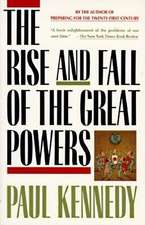Modernism: Seminar Studies
Autor Robin Walzen Limba Engleză Paperback – 22 noi 2012
The twentieth century was a period of seismic change on a global scale, witnessing two world wars, the rise and fall of communism, the establishment of a global economy, the beginnings of global warming and a complete reversal in the status of women in large parts of the world.
The modernist movements of the early twentieth century launched a cultural revolution without which the multi-media-driven world in which we live today would not have been possible. Today modernism is enshrined in art galleries and university courses. Its techniques of abstraction and montage, and its creative impulse to innovate and shock, are the stock-in-trade of commercial advertising, feature films, television and computer-generated graphics.
In this concise cultural history, Robin Walz vividly recaptures what was revolutionary about modernism. He shows how an aesthetic concept, arising from a diversity of cultural movements, from Cubism and Bauhaus to Abstract Expressionism and Pop Art, and operating in different ways across the fields of art, literature, music, design and architecture, came to turn intellectual and cultural life and assumptions upside down, first in Europe and then around the world.
From the nineteenth century origins of modernism to its postmodern legacies, this book will give the reader access to the big picture of modernism as a dynamic historical process and an unfinished project which still speaks to our times.
Din seria Seminar Studies
-
 Preț: 305.62 lei
Preț: 305.62 lei -
 Preț: 394.47 lei
Preț: 394.47 lei -
 Preț: 193.65 lei
Preț: 193.65 lei -
 Preț: 322.39 lei
Preț: 322.39 lei -
 Preț: 211.74 lei
Preț: 211.74 lei -
 Preț: 308.31 lei
Preț: 308.31 lei -
 Preț: 307.27 lei
Preț: 307.27 lei -
 Preț: 307.81 lei
Preț: 307.81 lei -
 Preț: 314.15 lei
Preț: 314.15 lei -
 Preț: 305.87 lei
Preț: 305.87 lei -
 Preț: 325.56 lei
Preț: 325.56 lei -
 Preț: 330.52 lei
Preț: 330.52 lei -
 Preț: 305.64 lei
Preț: 305.64 lei -
 Preț: 314.51 lei
Preț: 314.51 lei -
 Preț: 316.74 lei
Preț: 316.74 lei -
 Preț: 307.66 lei
Preț: 307.66 lei -
 Preț: 308.53 lei
Preț: 308.53 lei -
 Preț: 307.29 lei
Preț: 307.29 lei -
 Preț: 299.85 lei
Preț: 299.85 lei -
 Preț: 314.15 lei
Preț: 314.15 lei -
 Preț: 306.96 lei
Preț: 306.96 lei -
 Preț: 314.43 lei
Preț: 314.43 lei -
 Preț: 402.50 lei
Preț: 402.50 lei -
 Preț: 305.91 lei
Preț: 305.91 lei -
 Preț: 346.51 lei
Preț: 346.51 lei -
 Preț: 310.46 lei
Preț: 310.46 lei -
 Preț: 322.16 lei
Preț: 322.16 lei -
 Preț: 306.40 lei
Preț: 306.40 lei -
 Preț: 306.40 lei
Preț: 306.40 lei -
 Preț: 349.57 lei
Preț: 349.57 lei -
 Preț: 322.23 lei
Preț: 322.23 lei -
 Preț: 304.44 lei
Preț: 304.44 lei -
 Preț: 314.06 lei
Preț: 314.06 lei -
 Preț: 332.21 lei
Preț: 332.21 lei -
 Preț: 322.46 lei
Preț: 322.46 lei -
 Preț: 308.53 lei
Preț: 308.53 lei -
 Preț: 204.23 lei
Preț: 204.23 lei -
 Preț: 307.94 lei
Preț: 307.94 lei -
 Preț: 306.30 lei
Preț: 306.30 lei -
 Preț: 427.55 lei
Preț: 427.55 lei -
 Preț: 316.58 lei
Preț: 316.58 lei -
 Preț: 330.10 lei
Preț: 330.10 lei -
 Preț: 266.30 lei
Preț: 266.30 lei -
 Preț: 305.48 lei
Preț: 305.48 lei -
 Preț: 348.97 lei
Preț: 348.97 lei -
 Preț: 308.92 lei
Preț: 308.92 lei -
 Preț: 308.05 lei
Preț: 308.05 lei -
 Preț: 307.94 lei
Preț: 307.94 lei -
 Preț: 305.98 lei
Preț: 305.98 lei -
 Preț: 305.91 lei
Preț: 305.91 lei
Preț: 237.49 lei
Preț vechi: 315.29 lei
-25% Nou
Puncte Express: 356
Preț estimativ în valută:
45.45€ • 48.60$ • 37.89£
45.45€ • 48.60$ • 37.89£
Carte tipărită la comandă
Livrare economică 17 aprilie-01 mai
Preluare comenzi: 021 569.72.76
Specificații
ISBN-13: 9781408264492
ISBN-10: 1408264498
Pagini: 200
Dimensiuni: 170 x 240 x 10 mm
Greutate: 0.27 kg
Ediția:Revizuită
Editura: Taylor & Francis
Colecția Routledge
Seria Seminar Studies
Locul publicării:Oxford, United Kingdom
ISBN-10: 1408264498
Pagini: 200
Dimensiuni: 170 x 240 x 10 mm
Greutate: 0.27 kg
Ediția:Revizuită
Editura: Taylor & Francis
Colecția Routledge
Seria Seminar Studies
Locul publicării:Oxford, United Kingdom
Public țintă
UndergraduateCuprins
PART ONE ANALYSIS AND ASSESSMENT. 1. THE PROBLEM. What is Modernism? 2. THE HISTORICAL ORIGINS OF MODERNISM. Art and Modernity in the Nineteenth Century. The Perceptual Revolution. 3. HIGH MODERNISM. The Early Avant-Garde. The Radical Avant-Garde. The New Sobriety. 4. AFTER MODERNISM. The Neo-Avant-Garde. Postmodernism. PART TWO DOCUMENTS. 1. Charles Baudelaire, ‘The Painter of Modern Life’. 2. Virginia Woolf, ‘Mr. Bennett and Mrs. Brown’. 3. Henri Matisse, ‘Notes of a Painter’. 4. Wassily Kandinsky, Concerning the Spiritual in Art. 5. Piet Mondrian, “Neo-Plasticism: The General Principle of Plastic Equivalence”. 6. Emil Nolde, ‘On Primitive Art’. 7. F. T. Marinetti, ‘The Founding and the Manifesto of Futurism’. 8. Tristan Tzara, ‘Dada Manifesto 1918’. 9. André Breton, “The Manifesto of Surrealism. 10. Le Corbusier and Amédée Ozenfant, ‘Purism’. 11. Walter Gropius, ‘The Theory and Organisation of the Bauhaus’. 12. Alfred H. Barr, Jr., Cubism and Abstract Art. 13. Clement Greenberg, ‘Avant-Garde and Kitsch’. 14. Walter Benjamin, ‘The Work of Art in the Age of Mechanical Reproduction’. 15. Richard Hamilton, ‘For the Finest Art try – POP’. 16. Peter Bürger, ‘The Negation of the Autonomy of Art by the Avant-Garde’. 17. Jean Baudrillard, Simulations. 18. Frederic Jameson, ‘Postmodernism, or The Cultural Logic of Late Capitalism’. 19. Lucy R. Lippard, ‘Trojan Horses: Activist Art and Power”. 20. Raymond Williams, ‘When Was Modernism?’ FURTHER READINGS. REFERENCES. INDEX.
Notă biografică
Robin Walz is Associate Professor of History at the University of Alaska Southeast. He has published books and articles on Modernism and aspects of popular culture in the twentieth century.
Descriere
Robin Walz’s updated Modernism, now part of the Seminar Studies series, has been updated to include significant primary source material and features to make it more accessible for students returning to, or studying the topic for the first time.
The twentieth century was a period of seismic change on a global scale, witnessing two world wars, the rise and fall of communism, the establishment of a global economy, the beginnings of global warming and a complete reversal in the status of women in large parts of the world.
The modernist movements of the early twentieth century launched a cultural revolution without which the multi-media-driven world in which we live today would not have been possible. Today modernism is enshrined in art galleries and university courses. Its techniques of abstraction and montage, and its creative impulse to innovate and shock, are the stock-in-trade of commercial advertising, feature films, television and computer-generated graphics.
In this concise cultural history, Robin Walz vividly recaptures what was revolutionary about modernism. He shows how an aesthetic concept, arising from a diversity of cultural movements, from Cubism and Bauhaus to Abstract Expressionism and Pop Art, and operating in different ways across the fields of art, literature, music, design and architecture, came to turn intellectual and cultural life and assumptions upside down, first in Europe and then around the world.
From the nineteenth century origins of modernism to its postmodern legacies, this book will give the reader access to the big picture of modernism as a dynamic historical process and an unfinished project which still speaks to our times.
The twentieth century was a period of seismic change on a global scale, witnessing two world wars, the rise and fall of communism, the establishment of a global economy, the beginnings of global warming and a complete reversal in the status of women in large parts of the world.
The modernist movements of the early twentieth century launched a cultural revolution without which the multi-media-driven world in which we live today would not have been possible. Today modernism is enshrined in art galleries and university courses. Its techniques of abstraction and montage, and its creative impulse to innovate and shock, are the stock-in-trade of commercial advertising, feature films, television and computer-generated graphics.
In this concise cultural history, Robin Walz vividly recaptures what was revolutionary about modernism. He shows how an aesthetic concept, arising from a diversity of cultural movements, from Cubism and Bauhaus to Abstract Expressionism and Pop Art, and operating in different ways across the fields of art, literature, music, design and architecture, came to turn intellectual and cultural life and assumptions upside down, first in Europe and then around the world.
From the nineteenth century origins of modernism to its postmodern legacies, this book will give the reader access to the big picture of modernism as a dynamic historical process and an unfinished project which still speaks to our times.















